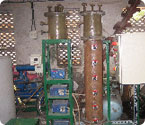Research Projects
In it ongoing efforts to maximize operational excellence and efficiency across its endeavours, Tatva has embarked upon several research initiatives. Tatva believes that research and innovation is of paramount importance in the waste management industry and that research leads to path breaking innovations.
The Company has come up with non-conventional, advanced treatment technologies for water and wastewater management and has developed various pilot models of these technologies. These pilot plants are operated to generate information about the design and development of larger facilities including their erection, commissioning and operation.
Given below is a brief overview of the various pilot plants set up by Tatva.
 |
This is a unique reactor where up-flowing effluent forms granular biomass that provides large surface area for microbial growth. The reactor has been designed with an exclusive separating mechanism for solid, liquid and gas phases. The plant has a capacity of 1.8m3/d and a fully automated system with a rapid start up and variable loads capacity. The pilot plant is equipped with an online pH correction system, and an auto gas collection system. The advantages of this set up include: 1. It has a high organic loading capacity (10-15 kgCOD/m3/d). 2. The reactor has no carrier material and mechanical components 3 Low energy and maintenance cost and low sludge production 4. Compact design 5. Patented three phase Internal Settler 6. Highly settleable granular biomass |
 |
This plant has a capacity to treat 125LPH of effluent and has been designed on the basis of the conventional aerobic sludge process. The plant is equipped with online DO meters to monitor DO levels in the aeration compartments. The treated effluent is collected through V-notch, and the sludge is separated in a clarifier. |
|
Tatva has entered into a technological agreement with CLRI (Central Leather Research Institute) for developing pilot plants based on advanced chemical oxidation treatment systems for the safe disposal of effluent. Given below is a look at the various technologies explored as part of this agreement. a) ECO (Electro Catalytic Oxidation) Treatment Based on the principle of Electro Catalytic Oxidation, this plant has been designed with a capacity of 100m3, divided into three compartments. This technology is used to decompose organic components that are difficult to degrade. This treatment is used prior to biological treatments, as all the toxic and non-degradable compounds are oxidized to simpler forms. b) CAACO (Chemo-Autotrophic Activated Carbon Oxidation) Treatment This system has bacteria in an immobilized stage in the carbon matrix. The technology has been developed by CLRI, Chennai and is now being engineered by AEEL. This treatment is very effective in oxidizing all organic components and thus reduces COD, BOD and removes colour as well. This technology is very effective where wastewater treatment and reuse is considered. |
Over the years Tatva has partnered with some of the world’s leading organizations to develop technology... |
|||
 |
|||
Over the past year, Tatva has engaged in a number of research studies to help produce... |
|||
 |
|||

